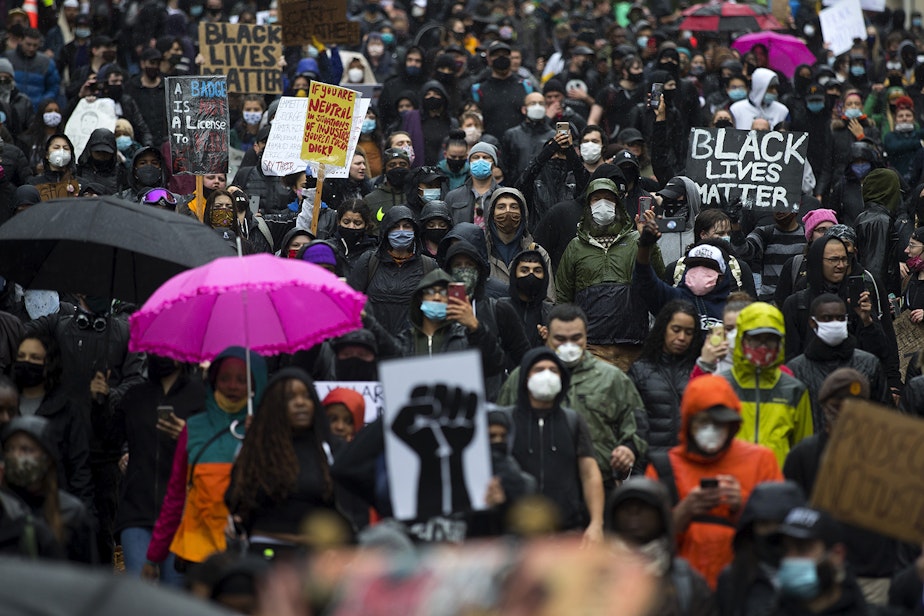An amazing feeling of solidarity, then the flashbangs

Thousands of people came out to protest police violence against Black Americans in Seattle and across the nation over the weekend.
Seattle educator Jesse Hagopian was at the demonstration in Seattle. He teaches English Language Arts and Ethnic Studies at Garfield High School, and is the co-editor of the book Teaching for Black Lives.
This interview has been edited for clarity.
You attended the protest with your family. Tell us what happened.
I was there with my wife and my two sons. It was an amazing feeling of solidarity. We'd been isolated from people for so long. To be in a gathering of many thousands of people, demanding justice and calling for an end to institutional racism and police violence was a really powerful feeling.
But it didn't last very long. We were listening to the chants and the speeches. Out of the blue, a police officer shot a flashbang grenade into the crowd. I hadn't seen any acts of violence at all from any protesters. The flashbang made a terrible sound, and smoke rising, and everyone started running.
My seven year old, was really upset. We're still talking about it with him today, and trying to work him through that trauma.
How are those conversations going? What are you saying to each other?
It's difficult. I mostly just want to know how he feels, and how I can support him. The main thing that both my kids decided they wanted to do today for their social studies lesson, since now I'm also a homeschool teacher, is to make a sign. They created their own protest sign today. I thought it was beautiful that they didn't let that aggression from the police just silence them, and they still want to go forward.
The protesters, they were mostly all young, many of them people of color. They're angry, disillusioned by the deaths of Black Americans at the hands of police. How do you talk with young people about what's going on right now?
I think it's imperative that every educator and every parent who has been conscripted into teaching their kids in this era of Covid-19 have difficult conversations with their classes or their own children about police violence.
I think, actually, this is really a moment to step back and allow the students and the youth to be the teachers. I think they're teaching us all a great lesson. They're teaching the nation about the power of solidarity and protest, and how not to just let racism continue generation after generation, but to stand up. I think us teachers are learning a lesson from them.
We are witnessing history being made every day. I'm wondering what you think the responsibility of teachers is in this moment, and even moving forward.
I think teachers have a responsibility at all times, but especially right now, to give context to the problems that we see in our society today. Certainly, police brutality is one of those problems that finally the mask is being ripped off of.
People are starting to see the brutality that has existed in the Black community for a long time. Our students are seeing these videos. They're being traumatized by them, and trying to make sense of them. What does this mean about our nation?
I think teachers have a responsibility to give it some context; to provide historical perspective; to show students that Black people have not just been victims throughout history, but have also been some of the most incredible agents of change, and have built collective struggles against institutional racism and police brutality; and to show them the history of many organizations and individuals who came together to confront these problems, then allow them to apply those lessons today.
I'm also thinking about the special relationship teachers can have with their students. Are you hearing from your own students? Are they reaching out to you?
Absolutely. I had a student tell me they were going to the protests this this weekend. Students who have been involved in organizing for ethnic studies in the school district, and students who have organized protests against the killing of Charleena Lyles by the Seattle Police Department. They wanted to get in touch with me and let me know they were going to continue this struggle.
I was really moved by that. To me, that's really the final exam of my class. It's not so much these high stakes tests and these grades that we use to rank and sort kids. When I see them applying lessons from the struggles I've taught them about in their own lives today, and I can see that there are really understanding the power of education.
Listen to the interview by clicking the play button above.





